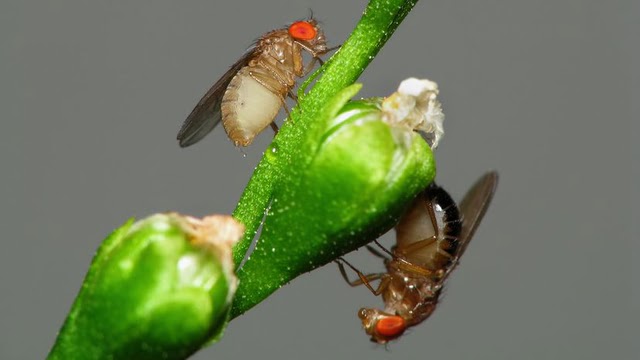Quck answer
Flies are attracted to sweet substances, such as honey, because they have a strong sense of smell and taste. Honey contains natural sugars that flies find irresistible. On the other hand, vinegar has a strong and pungent smell that repels flies. Additionally, flies are not able to taste the sourness in vinegar, which makes it less appealing compared to the sweet taste of honey. Therefore, when given a choice between honey and vinegar, flies will always prefer honey.
Wild Animals

A recent study has shown that flies prefer sweet food over sour food. This is perhaps why the saying “you catch more flies with honey than vinegar” came into being. Scientists have now discovered why flies have an aversion to vinegar. A study published in the journal Cell Reports on February 5, 2019, revealed that the first sour taste receptor in an animal has been discovered. It is crucial for animals to be able to detect the acid content in food, as it is a matter of life and death. Sour taste allows for the detection of hydrogen ions and organic acids, which helps animals to discriminate between safe and unsafe food. Flies can distinguish between different types of sour compounds to avoid microbial growth. The study also found that a specific protein, IR7a, is necessary for flies to detect the presence of acetic acid, which is the active ingredient in vinegar. The protein also helps the flies decide whether or not to pursue the concoction. The absence of the protein means that the flies cannot detect the presence of acetic acid. The researchers believe that the presence of IR7a in disease-spreading insect vectors, such as mosquitoes, could lead to ideas for controlling the way that mosquitoes are attracted to humans.
Now That’s Cool
The presence of vinegar isn’t always a deterrent. If done just right, it can actually attract unwanted fruit flies and gnats to trap them! Here’s one video, which requires only apple cider vinegar, dish soap and a plastic or glass bottle to get the job done.
FAQ
1. What makes flies prefer honey over vinegar?
Flies prefer honey over vinegar because they are attracted to sweet smells. Honey has a sweet scent, and vinegar has a sour smell. Flies are not attracted to sour smells, but they are attracted to sweet smells. Therefore, they are more likely to be drawn to honey than vinegar.
2. Why do flies like sweet smells?
Flies like sweet smells because they are attracted to sugar. Sugar is a source of energy, and flies need energy to survive. Sweet smells indicate the presence of sugar, so flies are naturally drawn to them.
3. Can flies taste the difference between honey and vinegar?
Yes, flies can taste the difference between honey and vinegar. Flies have taste receptors on their feet and mouthparts, which allow them to taste different substances. Honey has a sweet taste, while vinegar has a sour taste. Flies are more attracted to sweet tastes than sour tastes, so they prefer honey over vinegar.
4. Is it only honey that flies are attracted to?
No, flies are attracted to a variety of sweet substances, not just honey. For example, they are also attracted to sugar, fruit, and nectar. Anything that has a sweet scent or taste is likely to attract flies.
5. Why do flies need sugar?
Flies need sugar for energy. Sugar is a source of carbohydrates, which provide energy for the fly’s body. Flies are constantly on the move, so they need a lot of energy to fly, walk, and crawl around.
6. Can flies survive without sugar?
Yes, flies can survive without sugar, but they will be weaker and less active. Sugar provides a quick source of energy for flies, so if they are deprived of sugar, they will have to rely on other sources of energy, such as fat. This will make them less active and less able to fly.
7. How do flies find sweet substances?
Flies find sweet substances by following their sense of smell. They have a highly developed sense of smell, which allows them to detect even small amounts of sugar in the air. Once they detect a sweet smell, they will fly towards the source of the smell.
8. Why don’t flies like sour smells?
Flies don’t like sour smells because they are not attracted to sour tastes. Sour tastes indicate the presence of acids, which are not a source of energy for flies. Therefore, they are less likely to be drawn to sour smells than to sweet smells.
9. Can flies taste other flavors besides sweet and sour?
Yes, flies can taste a variety of flavors, including bitter, salty, and umami. However, they are more attracted to sweet tastes than any other taste, because sweet tastes indicate the presence of sugar, which is their primary source of energy.
10. Are all flies attracted to sweet smells?
No, not all flies are attracted to sweet smells. Some species of flies are attracted to other substances, such as decaying flesh or excrement. These flies are not attracted to sweet smells, because they do not feed on sugar.
11. Can flies develop a preference for certain sweet substances?
Yes, flies can develop a preference for certain sweet substances over others. For example, they may prefer honey over sugar, or fruit over nectar. This preference may be influenced by the fly’s previous experiences with different sweet substances.
12. Is it possible to repel flies with sour smells?
Yes, it is possible to repel flies with sour smells. Flies are not attracted to sour smells, so if you use a sour-smelling substance, such as vinegar, it may repel flies. However, this may not be effective in all cases, because some flies may still be attracted to other substances, such as decaying flesh.





Leave a Reply